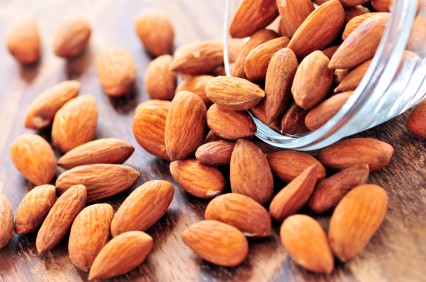Everyone wants to be happy, and we can go to some pretty crazy lengths to try to achieve this elusive feeling. But the first step towards a joyful life may be hiding right behind your pantry door.
Studies have shown substantial links between nutrition and mood — with certain foods better able to flip the happy switch. Why? Basically, dietary changes can bring about changes in our brain structure, with certain nutrients playing a vital role in keeping our noggin healthy. A healthy brain, in turn, leads to a better mood. So how do we keep our brain happy? Read below for seven foods proven to put a little extra pep in your step.
Pumpkin seeds
Raw pumpkin seeds are one of the best plant-based sources of alpha-linolenic acid (ALA), a type of omega-3 fatty acid. Omega-3s are a type of polyunsaturated fatty acid that ensure healthy brain communication, protect against free radicals, have anti-inflammatory properties, and have been shown to effectively treat depression. Omega-3s are also found in walnuts, flaxseed, and chia seeds. A serving size for most nuts and seeds is one ounce and usually contains 150-200 calories. Unsure how much that is? One ounce of nuts is roughly a small handful or more specifically, about 14 walnut halves, 150 pumpkin seeds, or about 3 tablespoons of flax or chia seeds.
Salmon
Salmon, along with other fatty fish such as sardines, mackerel, and trout, is full of EPA and DHA, two other types of omega-3 fatty acid that have been found to elicit antidepressant effects in humans. Why? Omega-3s have anti-inflammatory properties that help fight many chronic diseases, including depression. They also affect the pathways in your brain that communicate with your body, essential for regulating mood. One 3-ounce serving of salmon is about the size of your palm and contains around 160 calories.
Healthy Carbs
Carbs seem to always get the short end of the fad diet stick, but they play an important role in regulating mood and behavior. Feelings of depression have been shown to follow consumption of diets low in carbohydrates. Carb-rich foods trigger the production of brain chemicals serotonin and tryptophan which promote feelings of well being. This doesn’t mean you should reach for the box of donuts, though. Noom green foods such as fruits, vegetables, and whole grain bread and pasta provide a more moderate mood lifting effect but one that will last longer without the post-cookie crash.
Mushrooms
Vitamin D is vital for reducing inflammation in the body and it also reduces risk of depression. Healthy vitamin D levels, aside from boosting your mood, can also help to keep muscles and bones strong, lower high blood pressure, reduce risk of cardiovascular disease, and reduce risk of diabetes. Mushrooms are one of the few foods that have naturally occurring vitamin D, but make sure to buy the wild variety as commercial mushrooms are normally grown indoors and therefore never develop a high level of Vitamin D.
Chickpeas
One cup of chickpeas contains more than half of your daily value of vitamin B6, a nutrient responsible for helping the body make several chemicals that carry signals from one nerve cell to another. This influences both brain development and function. It also helps the body make the hormones serotonin and norepinephrine, feel good chemicals that influence mood and the sleep cycle.
Spinach
Thanks to Popeye, spinach’s reputation precedes it. But it isn’t all hype. While you may not find your biceps busting through your t-shirt after a helping of spinach, you will get a healthy dose of folate. Folate helps the body create new cells and supports serotonin regulation. Got a hot date? Aside from regulating mood, serotonin also regulates social behavior, meaning you’re more likely to behave rationally towards and care about other people.
Almonds
Every organ in your body needs magnesium. Aside from regulating nutrients in the body and promoting bone and dental health, magnesium contributes to energy production. Besides kicking your afternoon coffee to the curb, magnesium also contributes to serotonin production, which, as you know by now, is a major player in making you feel happy. Nuts, especially almonds, cashews, and peanuts, are a great source of magnesium. Try to buy your nuts raw or dry roasted. The oilier varieties have added calories without much additional flavor.



